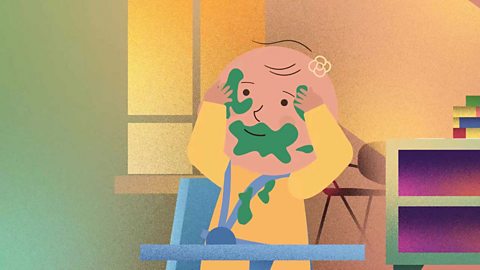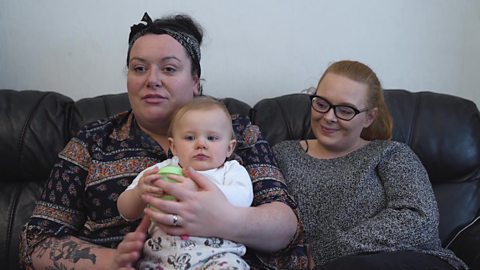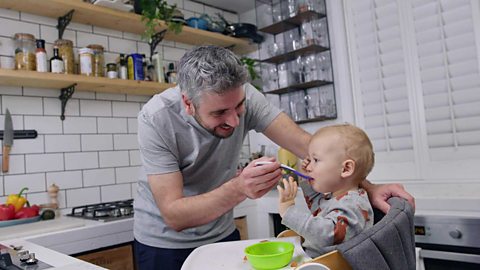Family mealtimes are a great opportunity to spend quality time with your child. But if it sometimes feels stressful trying to keep your little one entertained while you cook and clear away, youãre not alone!
Luckily, there are lots of simple activities you can play with your baby or toddler to include them in every part of your meal timesãÎ even the food shop. And not only will you be making your life easier (after all, a happy baby means a happy parent), youãll be giving your little one a brain boost as well.
Speech and language therapist Janet Cooper says, ãTalking to your child doesnãt have to take extra time. Build it into your daily routines, including your family meals, so it feels like a natural thing to do. Itãs fantastic for a babyãs brain development.ã
Janet shares her top games to tryãÎ
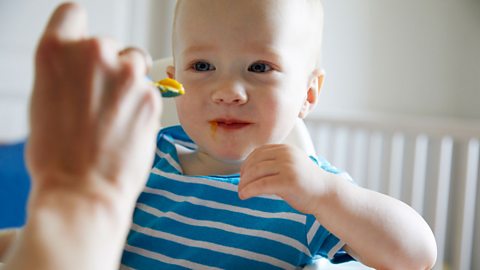
Supermarket hunt
Make a shopping list by either drawing or sticking on pictures of what you need. Then show the list to your baby or toddler and, if theyãre old enough, they can help you find each item.
ãChildren understand words well before they say them,ã says Janet. ãIf you can get them finding things for you, this will encourage them to do the talking later on.ã
If youãve got a younger baby, give them the list to hold and talk to them about what youãre looking for.
ãThe first layer of speech and language development is interaction,ã adds Janet. ãThis includes eye contact, taking turns and sharing an interest with someone else. You can involve even a young baby in your supermarket shop.ã
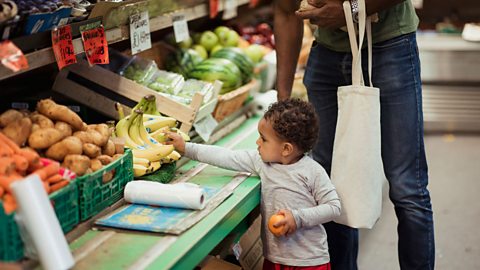
Cooking peek-a-boo
Put your baby in their high chair or another safe place and play a fun game of peekaboo while you get the food ready. Janet says, ãBabies love peekaboo play, even if they donãt yet have object permanence (this is knowing something is there, even if you canãt see it). For little babies, seeing your face pop out from behind a tea towel will be exciting for them."
This will keep them engaged while youãre chopping or stirring.
For an older child, line up three plastic cups, upside down. Put an object under one of the cups and get them to guess which one to lift up. Janet adds, ãChildren are very sensory. If itãs safe, get them to find things that they can hold and put in their mouths, like a piece of cooked carrot. By tasting the carrot, they are getting extra feedback about the word youãre saying.ã
Breakfast shaker
Breakfast can be a rush, especially if you need to leave for work or drop older children at school. So try this simple shaker game to encourage your little one to eatãÎ and boost their development at the same time. Fill an old plastic bottle with rice and give it to your baby to shake while you make their breakfast. Janet says, ãYou could even make up a little song while they shake the bottle to signal the start of breakfast.ã
Not only are the sounds fun for your little one, itãs a great way to teach them about ãcause and effectã. By their action (shaking the bottle), they are making something happen (an exciting noise!)
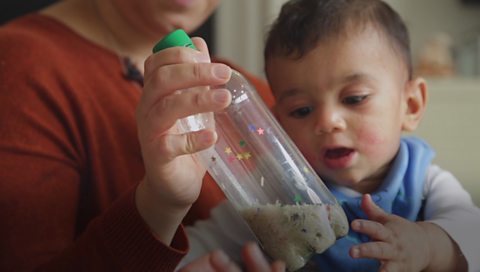
Lunchtime funny faces
Make lunchtimes fun by making faces or animals out of their food. You could use cut up grapes for eyes, soft carrot sticks for hair and cheese or ham for the mouth.
Janet says, ãIf you have a toddler, ask them to guess what youãve made. Or they can make their own funny face. Then say, ãCan you eat the nose?ã, ãCan you eat the eyes?ã. This helps with comprehension because youãre labelling things. Plus, itãs a fun way to get your child to eat their lunch.ã
Picnic eye spy
If the sun is shining, why not take your child out for a picnic. And donãt let rain stop you ã just put a towel on the floor and have a picnic in your lounge.
For the game, all you need is a cardboard tube from a kitchen roll or toilet roll. Ask your child to look through the tube to see what they can spot. You can also get them to find things, for example, ãCan you see the bird?ã.
ãTake photos of what they see. You can then look at the pictures later on. This will help with memory and reinforces the language,ã says Janet
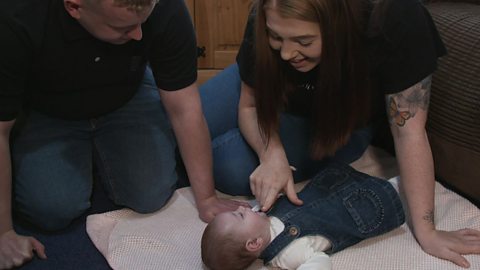
Dinner time tickles
After a long day, make dinner a time to de-stress with this fun tickling game. Janet says, ãA game where youãre rewarded with smiles and giggles from your baby is a great way to unwind. Try ãround and round the gardenã but change the words to tell them about your day. For example, it could be, ãOff I went to work today, my day was good to fair. One step, two step, tickly under thereã."
Babies are fantastic listeners and itãs a great chance for you to offload and for them to hear all those language patterns.
If youãve also got a toddler, get them to do the tickling on your baby and repeat some of the lines. ãItãs interactive and your toddler will like trying to copy what you say,ã adds Janet.
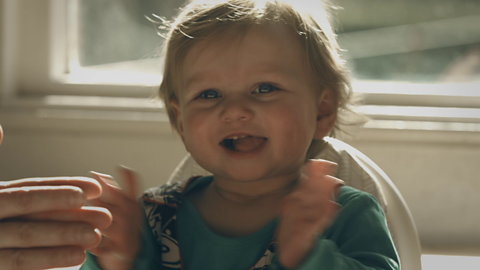
Eating out: your turn, my turn
If youãre having a family meal out, you want to make sure you get to eat your food while itãs still hot. To do this, Janet suggests playing the ãyour turn, my turnã game. "Feed your baby a mouthful while saying ãweeeeeeeee, your turn. Then eat a mouthful of your meal saying, ãweeeeeeee, my turn." Repeat this and involve your partner or other children so you all take turns.
Not only does this mean you get to enjoy your meal, your baby is learning about turn taking. This is a building block for conversation.
Family fun
Got the grandparents or friends over for lunch? 'Whatãs in the bag?' can be played at a table or if youãre all sitting down in your front room. Simply fill a bag with objects (make sure theyãre safe for babies to hold) and pass the bag round. A bit like pass the parcel, play music on your phone: when the music stops, the person with the bag can feel for an object and take it out. Itãs a great way of involving everyone and your child will love the surprise of seeing what comes out the bag.

